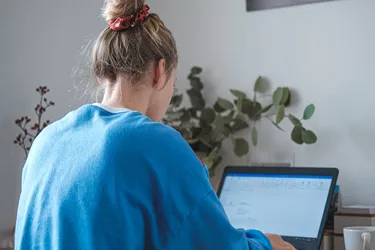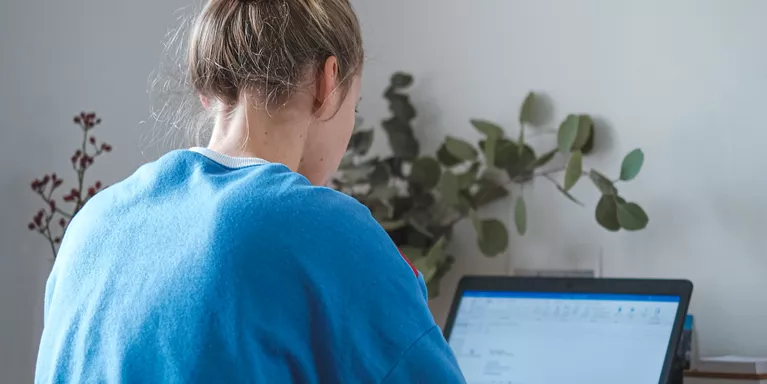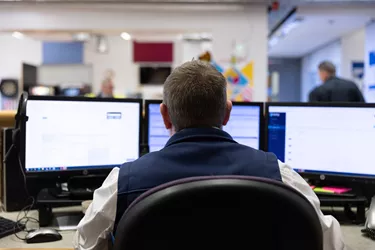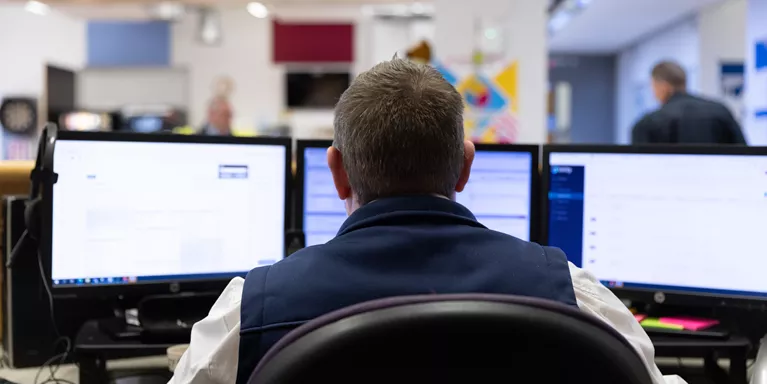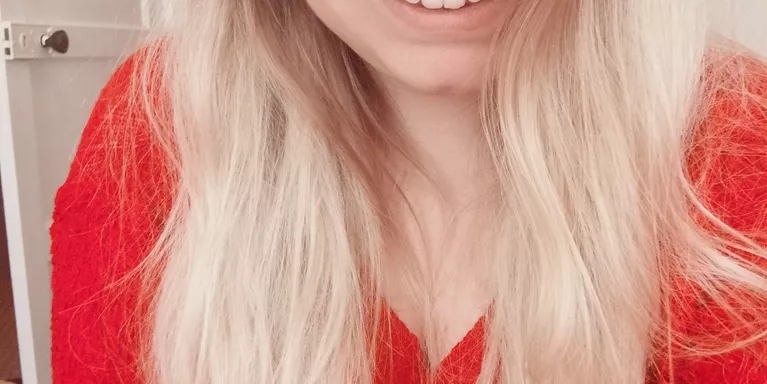How Active Monitoring helped me get my self-esteem back
*Active Monitoring is now called supported self-help.
Anna, from Swansea, blogs about how our Active Monitoring programme helped her regain her confidence after a difficult time – and how she now helps clients as an Active Monitoring practitioner.
At the beginning of the pandemic, I had just moved to Swansea. I was working in healthcare, and there was no change in workload. In fact, I didn’t feel like I could step away from my work at all during lockdown; I prioritised it over my personal life and I found it difficult to find any sort of balance. I found myself at work on an almost daily basis, and quickly became exhausted.
I’m usually quite a social person, so having my only interaction be with service users – who were physically or mentally unwell and struggling themselves – made my days quite dark and isolated. This actually made it harder for me once things started opening back up; I felt I couldn’t make it to the shops or to see friends because my confidence was so low. I had no motivation to do anything - the only reason I left my flat was to go to work, and that was because people were depending on me.
I have a history of mental health problems, including anxiety and depression which stemmed from eating disorders, but because I was working in mental health, I didn’t feel comfortable accessing support for myself. In fact, it made me feel like a bit of a fraud. I didn’t want to admit that I should know better, and I had no motivation or confidence to go to my GP. I couldn’t bring myself to deal with that process, psyching myself up to tell someone over and over that I wasn’t doing well.
I finally googled what help was available, and Active Monitoring popped up. The fact you could self-refer online was a big part of the appeal to me. Truthfully, if the self-referral aspect wasn’t there, I wouldn’t have gone ahead with finding support.
However, I’m glad I did. The way Active Monitoring works means that I only had to explain myself once. I wasn’t expecting it to be very effective, and actually was quite sceptical. However, my practitioner put me at ease. He was an excellent listener and gave me the space to talk about myself.
That made a huge difference. As someone who has been caring for people, in a professional capacity since I was 18 and a personal capacity since I was a child, it was great to have someone happy to listen to me as a service user. They were also really helpful in a practical way. I didn’t have a laptop at the time and was participating on my phone, so my practitioner posted the programme resources out to me.
The weekly meetings motivated me to complete the self-help worksheets. The first week, I hadn’t done them, but as I realised my practitioner would ask me each week how I got on with them, I thought ‘I may as well’.
They weren’t a huge effort to complete, and they grounded me. I quickly saw the point of them as I began setting goals for myself.
My practitioner had suggested Facetiming someone because I wasn’t comfortable socialising yet. At first I said ‘not a chance’, but the fact he was engaging with me and asking about my goals on a weekly basis motivated me to get in touch with someone. We ended up chatting for an hour and a half! It made such a difference and I saw it as a stepping stone to getting used to socialising. Eventually I was interacting with all the zoom quizzes and setting up plans, even getting the confidence to say to friends “I’ve missed you all, let’s do something!”. It was a lovely way to connect.
Active Monitoring has helped me to see I’m not just someone who’s a helper, I also need help.
I’m allowed to not be okay, and that was huge thing to realise. It was the first time I’d done something good for my own mental health.
Now, I implement the coping techniques and tools on a regular basis. When I get stressed, the first thing I do is put pen to paper and try to process my feelings that way. This has been a habit since May last year.
One of the things I’ve consistently used is the gratitude diary, which directly challenges things before I get to a point of feeling overwhelmed and catastrophising everything. I’m finding something each day to be grateful for, and internally noting the positives instead of storing the negatives in my mind.
Since completing the Active Monitoring course, I’ve actually became an Active Monitoring practitioner myself. I try to instil in my clients that taking time out for yourself is self-care – even if it’s twenty minutes to half an hour every week, it’s yours.
Because I’ve been a service user myself, it’s been really helpful for me to understand clients’ perspectives. It’s given me a totally different sense of empathy - I understand the common difficulties, the dread before the phone calls, the struggles. But I also know first-hand how beneficial the course can be, and the tools it can provide to make life easier. It’s given me real confidence as a practitioner.
I always ask my clients to write a compassionate letter to themselves when they’ve completed the programme, so they can look back on their feelings throughout.
It’s great to see people realise how their ways of coping have improved.
I can’t recommend Active Monitoring enough. The thing about self-help is that you need to know exactly what that means to you. It’s easier when you have someone there to support you, so when you feel rock bottom and you can’t figure it out yourself, someone is there to guide you along the way.
It’s empowering to be given that choice. I am now much more confident, much happier and much more in control of my life, and I like the fact that through my work I can provide that to people who are in the same position I was in.
Anna is a mental health practitioner in Swansea. She enjoys anything adrenaline filled that proves her anxiety wrong, from meeting new people to bungee jumps and abseiling - the bigger the challenge the better!


Information and support
When you’re living with a mental health problem, or supporting someone who is, having access to the right information - about a condition, treatment options, or practical issues - is vital. Visit our information pages to find out more.
Share your story with others
Blogs and stories can show that people with mental health problems are cared about, understood and listened to. We can use it to challenge the status quo and change attitudes.










